- Home
- Georgette Heyer
They Found Him Dead Page 5
They Found Him Dead Read online
Page 5
‘No wonder,’ said Joe sympathetically. ‘I’m sure we all understand how you must be feeling. But, as I said to Paul, you’ll be the first to appreciate Roberts’s position. In actual fact I believe I’m right in saying that we are all three of us agreed on the subject?’ He paused, but Clement stood frowning down at the floor, and said nothing. Joe glanced momentarily towards his son, and resumed with a rather false air of heartiness: ‘Well, well, we’ve talked it over so often that we needn’t go into it again now. As you know, Roberts came down from town last night to get Silas’s final answer. Naturally things will have to remain in abeyance until after probate, but I fancy we shall have no difficulty in coming to an agreement on the future policy of the firm, and can give our friend here his answer now. What do you say, Clement?’
There was a short silence. Clement was thinking of what the upkeep and the probable refurnishing of Cliff House would cost him; of death duties, and the super-tax he would have to pay; of the pearls Rosemary must have. Silas had been right: this Australian project was a chancy business. It meant locking up a lot of capital without any certainty of an adequate return. Easy enough for the Mansells to talk so lightly about it. They wouldn’t be risking anything. He looked up and said: ‘Really, I don’t think I am in a position to say anything definite at the moment. I shall have to look into things carefully. The whole situation has altered. I don’t feel I ought to commit myself rashly before I see just how I stand. I’m sure Mr Roberts will understand that it is quite impossible for me to give him an answer today.’
Oscar Roberts replied before Joe Mansell could speak: ‘Why, surely, Mr Kane! I reckon it wouldn’t be reasonable to expect you to decide anything at a moment’s notice like this.’
‘Exactly! This has come upon me so unexpectedly that really I hardly know what is happening. I only came to the office to inform you of Silas’s death, Joe, in case you shouldn’t have heard about it. I’m going up to Cliff House immediately to see my great-aunt, and to make the – er – the necessary arrangements.’ He glanced at his wrist-watch. ‘Yes, I see I’m late already. I have to pick my wife up on the way. I shall have to ask you to excuse me.’
He hurried away. Oscar Roberts sat still, with his long legs crossed, a faint, imperturbable smile on his lips. Paul Mansell said with an unpleasant ring in his voice: ‘So that’s how it’s going to be, is it?’
Joe had been standing rather foolishly gazing at the door through which Clement had gone, but he turned as his son spoke, and said robustly: ‘Nonsense, my boy, nonsense! It’s very natural he should feel all at sea just at first. Mr Roberts quite understands that.’
‘Sure,’ said Roberts amiably. ‘I don’t want to hurry him unreasonably. You know my position, Mr Mansell. I want the best I can get for my firm, and you make the best. If I can fix things with you I’ll be glad to do so; if I can’t – well, I’ll have to negotiate with the next best.’
‘Quite, quite!’ Joe said. ‘We fully appreciate your position, and I think I may say – yes, I am sure I may say that we shall be able to give you a definite answer at no very distant date.’
On this note of optimism they parted. No sooner had Oscar Roberts left the room than Paul said furiously: ‘The damned skunk! I suppose you see what’s going to happen now he’s got his hands on the money-bags?’
‘We mustn’t leap to conclusions,’ Joe said. ‘He hasn’t had time to find his feet yet, that’s all it is.’
‘Oh, that’s all it is, is it?’ Paul said. ‘Just hasn’t found his feet! Well, if you ask me, he is finding them a dam’ sight too quickly! When I think that we’ve got rid of that old fool Silas only to find Master Clement –’
‘Paul, my boy! Paul!’ Joe interrupted, losing a little of his high colour. ‘You’re talking very wildly – very wildly indeed!’
‘Yes, and I feel wild!’ his son threw back at him. ‘Like a fool I thought that, if once Silas was out of the way, we could see our way clear. Now we’ve got a –’
Joe brought his open hand down upon the desk between them. ‘Hold your tongue!’ He saw Paul staring at him, and said in a milder voice: ‘It’s very tiresome; but I don’t despair of Clement by any means. He’ll come round. Why, he’s been in favour of the scheme all along! But this – this tragic business of Silas’s death – My dear boy, you can’t be too careful what you say. Anyone hearing you might well wonder –’
‘Whether I had anything to do with Silas’s death?’ Paul said, looking him in the eye.
Joe made a gesture with one hand. ‘Of course, it would be a preposterous idea; but we don’t want to give people the least cause to suspect that we did want him dead. And when you talk of having believed that once he was out of the way – well, it’s injudicious, my boy, extremely injudicious!’
Paul lit a cigarette, and flicked the match into the grate. ‘Naturally I only meant that we’ve heard so much about Silas’s weak heart that I couldn’t help envisaging the possibility of his death.’
‘Naturally, naturally!’ Joe agreed. ‘But though the very notion is absurd, one has to be careful. There’s bound to be an inquiry, and one doesn’t want the least hint of suspicion – not that any sane person could possibly imagine for a moment –’
‘Well,’ said Paul blandly, ‘if the police suspect foul play, I fancy they’ll be more interested in Clement’s movements last night than in mine.’ He paused, and inhaled a deep breath of smoke. ‘What makes you think there was foul play, Dad?’
Joe started. ‘I? Good God, I don’t think it! Nothing of the sort! Nobody could think such a thing! Nobody who knew Silas!’
He was wrong. Mr Timothy Harte, having spent an awe-inspiring hour watching the proceedings of the police, inspecting the scene of the accident, and cross-examining Pritchard and Ogle, told Miss Allison that he was now quite sure that Silas had been bumped off. Miss Allison took instant exception to this vulgar and unfeeling expression, and said that he was talking nonsense.
He looked her over with a sapient eye. ‘You can say it’s nonsense if you like, but all the same, I bet you think it was murder.’
‘I do not!’ said Patricia emphatically. ‘I think it’s all absolutely horrible, and that you’re making it worse by trying to turn it into a cheap thriller.’ She walked away from him, up the stairs to Mrs Kane’s rooms, conscious of a faint wish that Mr James Kane was present to quell his half-brother.
She was a young woman not easily shaken out of her calm, but the events of this fateful day were, she suspected, a trifle on her nerves. Policemen and ambulances, official questions, servants whispering together, and a general atmosphere of surmise and suspicion, were not conducive to a calm frame of mind. Nor was relief to be found in Mrs Kane’s presence.
Emily was in her own sitting-room, motionless in a straight-backed arm-chair, staring before her with blank, cold eyes, her shrunken mouth compressed, as though guarding secrets. Miss Allison knew herself to be overwrought when an odd fancy seized her that there was something ruthless about her employer.
Emily brought her gaze slowly to bear upon Miss Allison’s face. ‘Well?’ she said. ‘So they’ve taken him away?’
‘Yes,’ replied Patricia.
‘Nice scandal!’ Emily said. ‘Inquests! Post-mortems! My husband would turn in his grave!’
‘It’s very unpleasant,’ agreed Patricia. ‘But it’s only a matter of form.’
Emily looked at her queerly. ‘It is, is it?’
Coming immediately after Timothy’s sinister pronouncements, this grim utterance made Patricia feel uncomfortable. She met Emily’s look, and said after a moment: ‘What do you mean, Mrs Kane? What are you thinking?’
‘I?’ said Emily sharply. ‘I don’t think anything. All I know is, that my son is dead. What I think won’t bring him to life again. Yes, what is it?’
Ogle, in the doorway, brought the news of Mr and Mrs Clement
Kane’s arrival. Emily gave a short laugh, and said: ‘Show them up.’ To Patricia she added brusquely: ‘You needn’t go. In fact, you’re to stay.’
In a few minutes Ogle ushered the Clement Kanes into the room. Rosemary was wearing a blue linen frock, but Clement had found time to procure a black armband. Emily observed this immediately, and said: ‘I’d like to know what you’ve got to mourn about!’
This was not a very promising start to the interview. Clement replied that to wear an armband was usual, a mark of respect. He tried to make a speech of condolence, but was interrupted before he had uttered half a dozen words. ‘Never mind that!’ Emily said. ‘I don’t want your sympathy. I don’t want anyone’s sympathy, if it comes to that.’
‘I think I should feel like that too,’ remarked Rosemary critically.
‘You?’ said Emily. ‘You’d spend a twelve-month telling everyone what your emotions were. I know you!’
Rosemary took this in very good part, merely saying with a certain amount of interest, ‘I wonder if I should? Do you think I analyse myself too much? With my type that’s always a danger, of course.’
Miss Allison felt that Rosemary came off the best from this encounter. Emily could only glare at her, folding her lips more tightly than ever.
Clement, always ill at ease in his great-aunt’s presence, began to speak of future plans. Miss Allison guessed, when he said that he knew Emily would not wish to be alone in the house, that Rosemary had made up her mind to move into Cliff House immediately. She dreaded an explosion from Emily, but Emily heard Clement out in unencouraging silence. Watching her, Miss Allison felt that behind the mask of age Emily’s brain was working hard. There was something rather terrible about this stout, alert old lady who sat so still and looked so bleakly out of eyes that were arctic blue and expressionless.
‘Of course,’ Clement was saying, ‘we only wish to do what will be most agreeable to you: that goes without saying. But naturally I know how much supervision an estate entails, and it seemed to me – that is to say, I wondered – whether you might not prefer us not to wait for probate – which, you know, may take some time – but to come and stay with you as soon as possible.’
Under his great-aunt’s unwinking stare his voice dwindled, and finally ceased. Rosemary took up the thread, saying: ‘It seems rather silly not to move in now, don’t you think? Particularly as the people who have bought our house want possession as soon as possible.’
‘I suppose,’ said Emily, ‘that one of your maids has given notice.’
‘Both,’ replied Rosemary with complete candour. ‘Cook gave notice yesterday, because she says she can’t get on with the kitchener, and this morning that devil of a house-parlourmaid said she was going too, because cook’s leaving made her feel unsettled. I mean, I simply can’t face it.’
‘You can move in here when you like,’ said Emily.
Miss Allison, seated by the window, looked up from her needlework in momentary surprise, then bent her head again over the embroidery.
‘Darling, how angel of you!’ said Rosemary. ‘You’ve simply saved my life!’
‘Very kind – very kind indeed!’ Clement said, looking at the floor. ‘I need hardly say that we look upon this house as yours, Aunt Emily.’
‘Oh, utterly!’ agreed Rosemary. ‘I loathe having to look after a house, and I haven’t the least intention of interfering with anything here – except, of course, quite small details, like having my own rooms redecorated, which I absolutely must have done. I’m one of those people who are ridiculously sensitive to colour, and I know that if I had to have a blue sitting-room, for instance, it would get on my nerves to such an extent that I should probably go mad. But as for ordering meals, or telling the servants what to do, I should be quite, quite hopeless. I shall beg and implore Patricia to carry on just as usual.’
Miss Allison smiled, but said nothing. Emily, having listened to this speech with an expression of contempt on her face, turned her eyes towards Clement, and addressed him abruptly: ‘I’ve invited Jim to stay next week. If you don’t like it you’ll have to lump it.’
‘My dear aunt!’ protested Clement. ‘You have every right to invite whom you please, and as for my not liking to have Jim here, good heavens, I shall be extremely pleased to see him!’
‘I’ll tell him,’ said Emily sardonically. She moved her hands in her lap. ‘There’s another thing. What you do with the business is no concern of mine; but if you mean to take up with that plausible American I’ll have you know that your cousin was set against it. I dare say you and those Mansells think yourselves very clever, but there’s not one of you has the head my son had!’
Clement reddened, and replied with some annoyance: ‘Really, aunt, it is quite unnecessary for you to tell me that. I spoke to Silas about it last night, and I may say that upon reflection I fully agree with his view of the matter. Not that Roberts is an American. He has lived for some years in the States, but he is of English birth.’
‘That’s neither here nor there,’ said Emily. ‘He dined here last week, and I didn’t take to him. What’s more, he talks like an American. That’s enough for me.’
Clement permitted himself to smile rather superciliously, and to give the faintest shrug of the shoulders before changing the subject. He told his great-aunt that she must prepare her mind for the unpleasantness of an inquest, to which she replied that she was not born yesterday.
By the time the Clement Kanes took their departure Clement at least had won Miss Allison’s sympathy. It seemed to her that he was behaving towards Emily with patience and considerable restraint. Indeed, so unresentful of snubs did he show himself to be that Patricia ventured to ask Emily, when he had gone, what she found to dislike in him.
‘He’s a fool,’ Emily said harshly. ‘A weak fool! He and that wife of his!’ Her fingers worked on the silk of her gown. ‘A nice pair to succeed my son! A nice pair for me to live with for the rest of my days!’ A faint colour crept into her cheeks. Between their puckered lids her eyes stared straight ahead. ‘I wanted Jim,’ she said, more to herself than to Patricia. ‘It ought to be his, all of it! Clement! He’s only half a man!’
Patricia said nothing. The note of hatred in Emily’s voice was inexplicable and rather shocking.
‘And his father,’ said Emily, with concentrated venom, ‘was just such another! I’ve always hated ’em – the whole pack of them! Jim’s the only one worth tuppence.’ She pulled the shawl more tightly about her shoulders, and said: ‘I won’t see anyone else. If any of those Mansells call, you can send them about their business.’
Both Agatha Mansell and her daughter called during the course of the day, but although Agatha insisted upon seeing Patricia, she accepted without comment the message that Mrs Kane felt unable to receive visitors. Betty Pemble, however, assured Miss Allison that she quite understood, and gave into her charge an untidy posy of mixed flowers, the touching offering of her children, who (according to her account) had thought of it quite by themselves upon being told the sad news of Uncle Silas’s death.
‘I just told them that dear Uncle Silas has gone away on a long journey,’ she said. ‘They’re such mites, you know, and I’ve never let them hear about Death, or have ugly toys or stories about ogres and things. I mean, I do frightfully believe in keeping their little minds free from everything but happy, beautiful things, don’t you?’
‘A waste of time,’ pronounced Agatha. ‘Children are singularly heartless creatures.’
Not from conviction, but with the object of preventing Mrs Pemble from entering upon an involved argument in support of her offspring’s sensibilities, Miss Allison made haste to take the flowers, and to agree that all ugly things should be kept from the young. Betty, who had hitherto believed Miss Allison to be hard, and ‘what-I-call-unsympathetic,’ was pleased, and told her earnestly that when one of his Pemble aunts had sent Pet
er a golliwog for Christmas, she had instantly taken it away from him, and given him instead a sweet little woolly lamb.
‘Yes,’ said Agatha magisterially, ‘and had I been his mother I should have given him a good spanking for screaming from sheer temper as he did. I well remember the occasion. Not that I see what a golliwog has to do with Silas Kane’s death.’
She turned to Patricia, and desired her to recount the precise circumstances of the accident. She did not appear to believe that Patricia was unable to gratify her curiosity, for she continued to question her long after Patricia had confessed almost entire ignorance. Her manner was so majestic, and her voice so overpoweringly cultured that Patricia found herself apologising for knowing so little. It did not occur to her until that masterful presence was withdrawn that Agatha Mansell, who despised gossip and considered accidental deaths sensational and therefore vulgar, had been oddly anxious to possess herself of all the facts of the case.
Two more callers visited Cliff House to leave cards and sympathetic messages. One was Paul Mansell, who contrived to waylay Miss Allison in the garden and to pay her unseasonable addresses; the other was Oscar Roberts, who said naïvely that, having enjoyed the old lady’s hospitality, he wanted to do the civil thing.
Mr Harte, having looked Paul Mansell over with the mercilessly critical eyes of the youthful male, informed Miss Allison dispassionately that he seemed to be a pretty good tick. Oscar Roberts, however, whom he encountered in the drive, instantly won his approbation. Unlike Emily, Mr Harte had no prejudice against Americans. America for him was an Eldorado populated in its wilder regions by venial sheriffs and heroic cowboys; and in its towns by boot-leggers, gangsters, kidnappers, and G men. That another side to American life might exist he was happily unaware, so that when Oscar Roberts addressed him in the accents of his favourite film-star he believed that he stood in the presence of one who might at any moment produce a gun from somewhere about his person, and accorded him a reverent admiration that was strong enough to enable him to pardon Mr Roberts for having committed the awful solecism of hailing him as ‘son.’

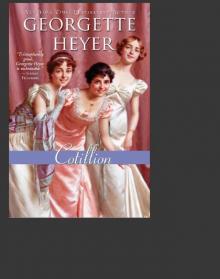 Cotillion
Cotillion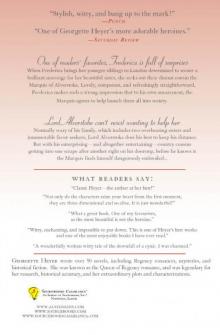 Frederica
Frederica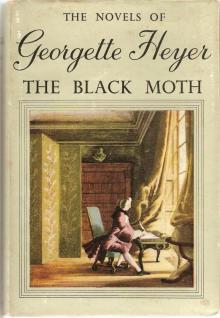 The Black Moth: A Romance of the XVIIIth Century
The Black Moth: A Romance of the XVIIIth Century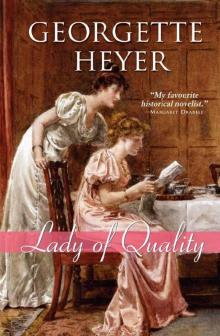 Lady of Quality
Lady of Quality Snowdrift and Other Stories
Snowdrift and Other Stories An Infamous Army
An Infamous Army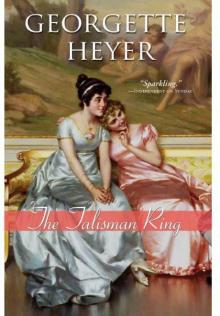 The Talisman Ring
The Talisman Ring Venetia
Venetia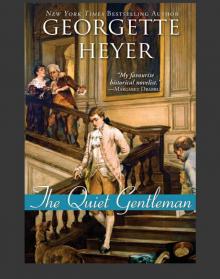 The Quiet Gentleman
The Quiet Gentleman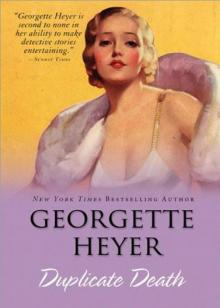 Duplicate Death
Duplicate Death Cousin Kate
Cousin Kate Black Sheep
Black Sheep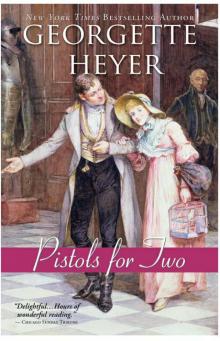 Pistols for Two
Pistols for Two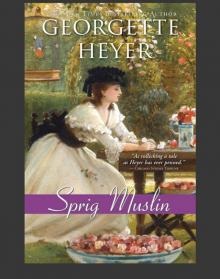 Sprig Muslin
Sprig Muslin No Wind of Blame
No Wind of Blame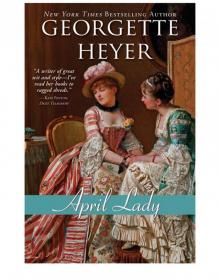 April Lady
April Lady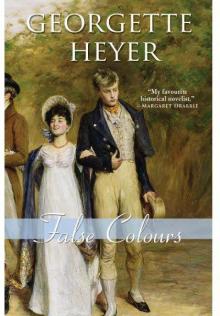 False Colours
False Colours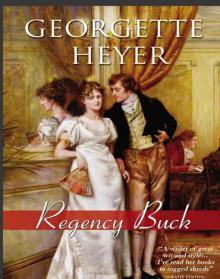 Regency Buck
Regency Buck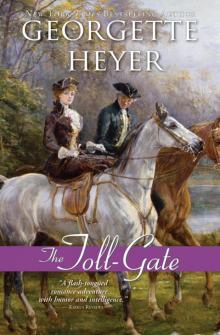 The Toll-Gate
The Toll-Gate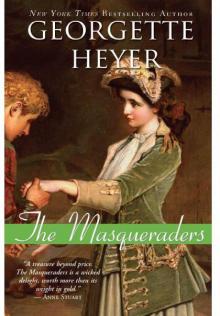 The Masqueraders
The Masqueraders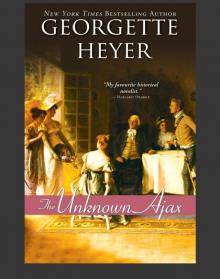 The Unknown Ajax
The Unknown Ajax The Grand Sophy
The Grand Sophy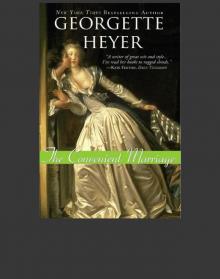 The Convenient Marriage
The Convenient Marriage Faro's Daughter
Faro's Daughter The Conqueror
The Conqueror The Foundling
The Foundling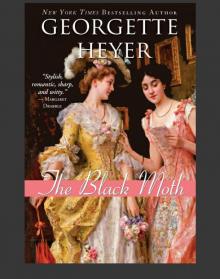 The Black Moth
The Black Moth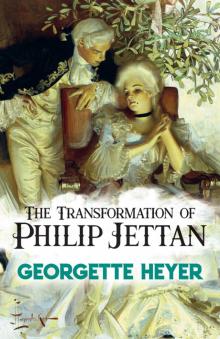 The Transformation of Philip Jettan
The Transformation of Philip Jettan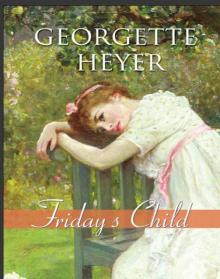 Friday's Child
Friday's Child Beauvallet
Beauvallet They Found Him Dead
They Found Him Dead Charity Girl
Charity Girl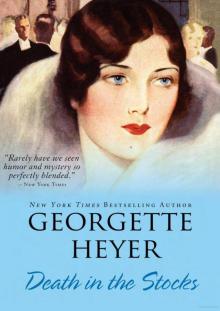 Death in the Stocks: Merely Murder
Death in the Stocks: Merely Murder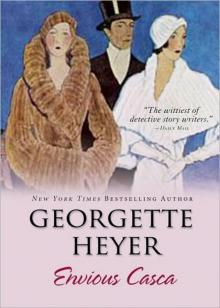 Envious Casca
Envious Casca Behold, Here's Poison
Behold, Here's Poison Arabella
Arabella The Nonesuch
The Nonesuch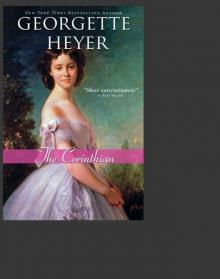 The Corinthian
The Corinthian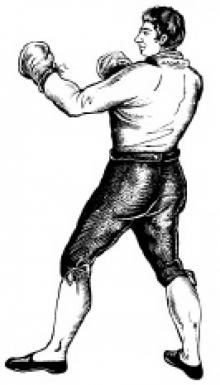 Jennifer Kloester
Jennifer Kloester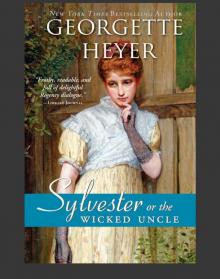 Sylvester
Sylvester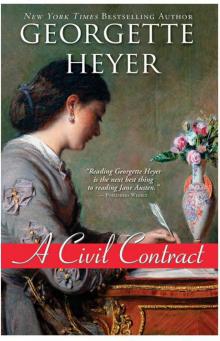 A Civil Contract
A Civil Contract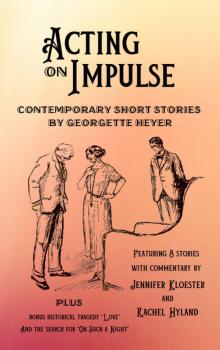 Acting on Impulse
Acting on Impulse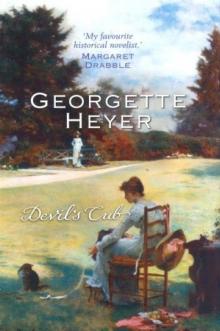 Devil’s Cub at-2
Devil’s Cub at-2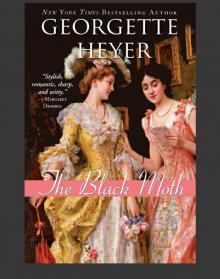 Black Moth
Black Moth Grand Sophy
Grand Sophy Instead of the Thorn
Instead of the Thorn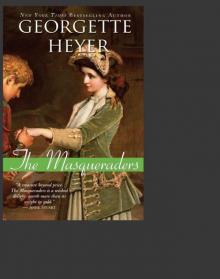 Masqueraders
Masqueraders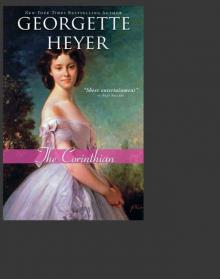 Corinthian
Corinthian Reluctant Widow
Reluctant Widow